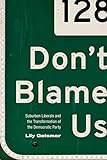Don't Blame Us : Suburban Liberals and the Transformation of the Democratic Party / Lily Geismer.
Material type: TextSeries: Politics and Society in Modern America ; 109Publisher: Princeton, NJ : Princeton University Press, [2014]Copyright date: ©2014Edition: Pilot project. eBook available to selected US libraries onlyDescription: 1 online resource (392 p.)Content type:
TextSeries: Politics and Society in Modern America ; 109Publisher: Princeton, NJ : Princeton University Press, [2014]Copyright date: ©2014Edition: Pilot project. eBook available to selected US libraries onlyDescription: 1 online resource (392 p.)Content type: - 9780691157238
- 9781400852420
- Liberalism -- United States -- History -- 20th century
- Suburbs -- Political aspects -- United States
- POLITICAL SCIENCE / Political Ideologies / Conservatism & Liberalism
- 1972 election
- American politics
- Boston busing crisis
- Cold War suburbs
- Cold War
- Democratic Party
- Equal Rights Amendment
- METCO
- Massachusetts Miracle
- Massachusetts exceptionalism
- Massachusetts liberal
- Massachusetts
- Metropolitan Council for Educational Opportunity
- Michael Dukakis
- New Right
- Reagan Revolution
- Route 128 suburbs
- Route 128
- The Battle over the Suburbs
- Vietnam War
- affirmative action
- affordable housing
- antiwar movement
- civil rights
- class inequality
- collective distinctiveness
- defense spending
- demographic changes
- economic inequality
- economic problems
- electoral politics
- environmental degradation
- environmental inequality
- environmental protection
- environmentalism
- equal opportunity
- exclusivity
- fair housing activism
- fair housing movement
- feminism
- grassroots activism
- high-tech corridor
- high-tech growth
- housing problems
- housing
- individual distinctiveness
- interracial cooperation
- knowledge professionals
- liberal activism
- liberal issues
- liberalism
- localism
- meritocratic individualism
- modern America
- modern liberalism
- multiracialism
- national recession
- national security
- open space
- political culture
- political ideology
- political tensions
- postwar suburbanization
- racial discrimination
- racial inequality
- residential inequality
- school desegregation
- school integration
- second-wave feminism
- segregation
- social inequality
- social justice
- suburban development
- suburban feminism
- suburban liberal activism
- suburban liberal activists
- suburban liberalism
- suburban liberals
- suburban politics
- suburbs
- urbanгuburban cooperation
- voluntary integration
- women's equality
- 324.27360904 23
- JK2316 .G34 2017
- online - DeGruyter
- Issued also in print.
| Item type | Current library | Call number | URL | Status | Notes | Barcode | |
|---|---|---|---|---|---|---|---|
 eBook
eBook
|
Biblioteca "Angelicum" Pont. Univ. S.Tommaso d'Aquino Nuvola online | online - DeGruyter (Browse shelf(Opens below)) | Online access | Not for loan (Accesso limitato) | Accesso per gli utenti autorizzati / Access for authorized users | (dgr)9781400852420 |
Frontmatter -- Contents -- Illustrations and Maps -- Acknowledgments -- Abbreviations -- Introduction -- Part I. Suburban Activism -- 1. No Ordinary Suburbs -- 2. Good Neighbors -- 3. A Multiracial World -- 4. Grappling with Growth -- 5. Political Action for Peace -- Part II. Massachusetts Liberals -- 6. A New Center -- 7. Open Suburbs vs. Open Space -- 8. Tightening the Belt -- 9. No One Home to Answer the Phone -- 10. From Taxachusetts to the Massachusetts Miracle -- Epilogue -- Notes -- Index
restricted access online access with authorization star
http://purl.org/coar/access_right/c_16ec
Don't Blame Us traces the reorientation of modern liberalism and the Democratic Party away from their roots in labor union halls of northern cities to white-collar professionals in postindustrial high-tech suburbs, and casts new light on the importance of suburban liberalism in modern American political culture. Focusing on the suburbs along the high-tech corridor of Route 128 around Boston, Lily Geismer challenges conventional scholarly assessments of Massachusetts exceptionalism, the decline of liberalism, and suburban politics in the wake of the rise of the New Right and the Reagan Revolution in the 1970s and 1980s. Although only a small portion of the population, knowledge professionals in Massachusetts and elsewhere have come to wield tremendous political leverage and power. By probing the possibilities and limitations of these suburban liberals, this rich and nuanced account shows that-far from being an exception to national trends-the suburbs of Massachusetts offer a model for understanding national political realignment and suburban politics in the second half of the twentieth century.
Issued also in print.
Mode of access: Internet via World Wide Web.
In English.
Description based on online resource; title from PDF title page (publisher's Web site, viewed 30. Aug 2021)


